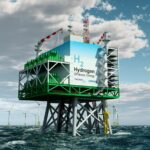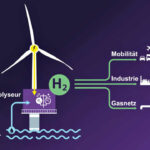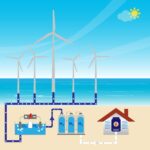Free and Hanseatic City of Hamburg
“For Hamburg as a major industrial and transport centre in the north, hydrogen offers great opportunities to further strengthen the economic performance of our city and its quality of life. Through the growing demand for green hydrogen in Hamburg, we are helping to create economies of scale that are beneficial for the entire energy region of northern Germany. “
Michael Westhagemann President of the Ministry of Economic Affairs, Transport and Innovation
As the largest metropolis in northern Germany, Hamburg faces particularly high demands in terms of climate protection and the sustainable safeguarding of its economic performance. These include the reduction of transport-related emissions, e.g. by switching to emission-free drive systems, as well as the orientation of industry towards products that will continue to be competitive and in demand even with the politically desired and ecologically necessary abandonment of fossil energy and basic materials. To ensure Hamburg’s future viability as a business location and urban living space, the coupling of mobility and industry with a sufficient supply of emission-free energy from renewable sources must therefore be addressed in a timely and systematic manner.
As the possibilities for generating and storing green energy in Hamburg are limited due to its structure as a city state and its urban density, Hamburg will largely obtain its green energy from the surrounding area today and in the future. With northern Germany as a large producer of green energy, there is therefore an optimal interaction between the metropolis and the surrounding area for the market. This does not only apply to the purchase of renewable energy. Rather, the conversion of surplus wind power into hydrogen and its use in industry contributes to the stabilisation of the grids and the expansion of value creation, especially in Hamburg. However, a prerequisite for this is that the hydrogen is made available at reasonable prices. The growing demand in Hamburg in turn creates the necessary economic economies of scale.
In the application of hydrogen technologies, Hamburg already has many years of experience, for example in the production of green hydrogen, the use of hydrogen fuel cell buses or the use of hydrogen in industrial processes. Based on this learning curve and against the background of the growing demands of climate protection, there is now an increasing willingness on the part of both commercial enterprises and public service providers to incorporate green hydrogen into the further development of their processes and offerings in the future. Hydrogen technologies and related topics are also the subject of numerous energy research projects in Hamburg, whose findings will make important contributions to the establishment and further development of a hydrogen economy. Hamburg has been able to rely on a diverse and highly committed field of actors in the hydrogen sector for decades. The activities have been bundled and structured by the Senate in a Cross Cluster Initiative. Thus, Hamburg was able to draw on extensive expertise during the preparation of the North German Hydrogen Strategy and will also use this in the further process of implementation and operationalisation for Hamburg and North Germany as a whole.
In addition, the Hamburg Senate supports this transformation process through its commitment to the development and future implementation and further development of the North German Hydrogen Strategy as well as through political specifications, such as the mandatory procurement of emission-free public buses from 2020.



